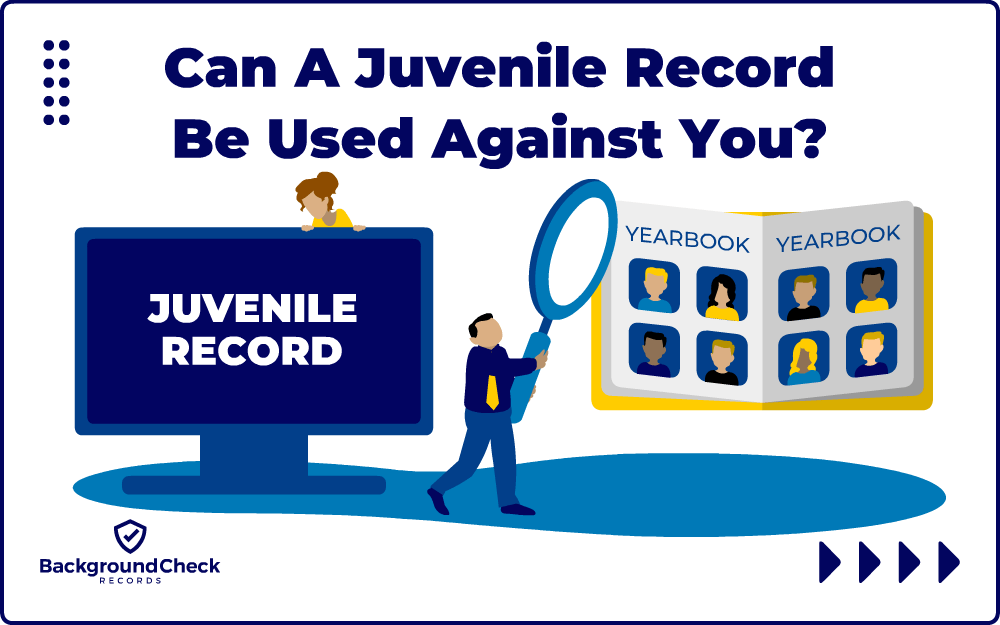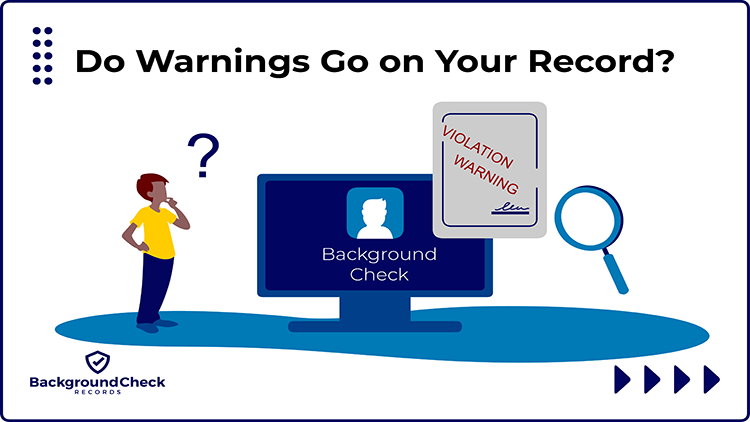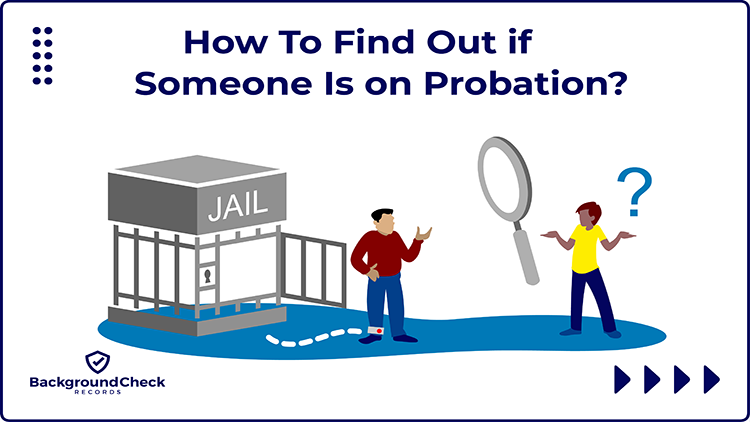Can a Juvenile Record Be Used Against You? (Yes and No)
Many individuals who have had encounters with the law as minors, or concerned parents about their children’s future, often question the implications of juvenile records being used against them.
The answer is not straightforward; it varies depending on several factors. These include the type and severity of the crime committed as a minor, the current age of the individual, and the number of offenses committed.
When Are Juvenile Records Used Against Adolescents?
Juvenile records are public records of minors under 18 resulting from interactions with law enforcement, which can include criminal and court records. A common inquiry concerns whether police reports appear on background checks when incidents occur during adolescence. The answer varies, as such reports typically do not constitute a criminal record.
However, juvenile records might impact adolescents while they are still minors. In fact, these records may be used in various ways:
- These records may be used against adolescents when they are witnesses in hearings. Defendants may have access to juvenile records to aid their cause and may target a juvenile as a flawed witness— they may lie on the stand and lose credibility.
- Juvenile records may lead to adolescents losing their driving licenses.
- They may also have these records revealed to school districts which may negatively impact their education.
- Adolescents who are not U.S citizens and have juvenile records risk being deported.
- Youths with juvenile records may also be prevented from accessing financial aid to help with college tuition; this often, in turn, jeopardizes their future careers, which can sometimes lead them to a life of crime.
- Some colleges even take the extreme step of barring those with juvenile records from being admitted with the notion that this makes these higher learning institutions safer. Many times, college applications will inquire into past convictions.
- Some families who have an adolescent with a juvenile record may also be prevented from obtaining housing.
When Can Juvenile Records Be Used Against You as an Adult?
There is a collective notion that when a juvenile turns 18, their record ceases to exist and does not carry into their adult life. While it is true that juvenile records are typically private and confidential, the reality of this seems to be obscured, and this depends on several factors.1
Unlike the adult court system, the juvenile system is meant to be more rehabilitative, attempting to provide the juvenile with a second chance and mend their lives before transitioning to adulthood.
While some states usually seal these records automatically, others don’t, depending on the type of crime involved.
Adults who have a past juvenile criminal charge often wonder about the implications of their juvenile record being used against them in adulthood. Here are the various ways juvenile records can impact individuals as they transition into adulthood:
- During sentence hearings, juvenile records may be dug from the past in the case of adult criminal defendants. In other words, their history may have a bearing on what they are currently on trial for, affecting it negatively.
- Juvenile records may potentially show up in background checks in certain instances and this may bar these individuals from gaining employment.
- Juvenile records may prevent adults from obtaining housing, in some cases public housing.
- Adults with these records may also be prevented from enlisting in the military.
- Access to professional licenses in some professions may also be closed off to those with juvenile records.
- Some adults who committed crimes as a minor may be prevented from accessing social welfare programs.
- As a result of all these obstacles, these adults may become unemployed, homeless, and potentially spiral back into a life of crime—defeating the purpose of rehabilitation that juvenile courts were set up for.
With these matters in mind, it’s a harsh reality that juvenile records can follow you, and furthermore, when considering in 2019, almost 700,000 youth were arrested under the age of 18.2 And over 60% of applicants are discouraged from completing applications at educational institutions due to background check requirements that may expose juvenile records.3
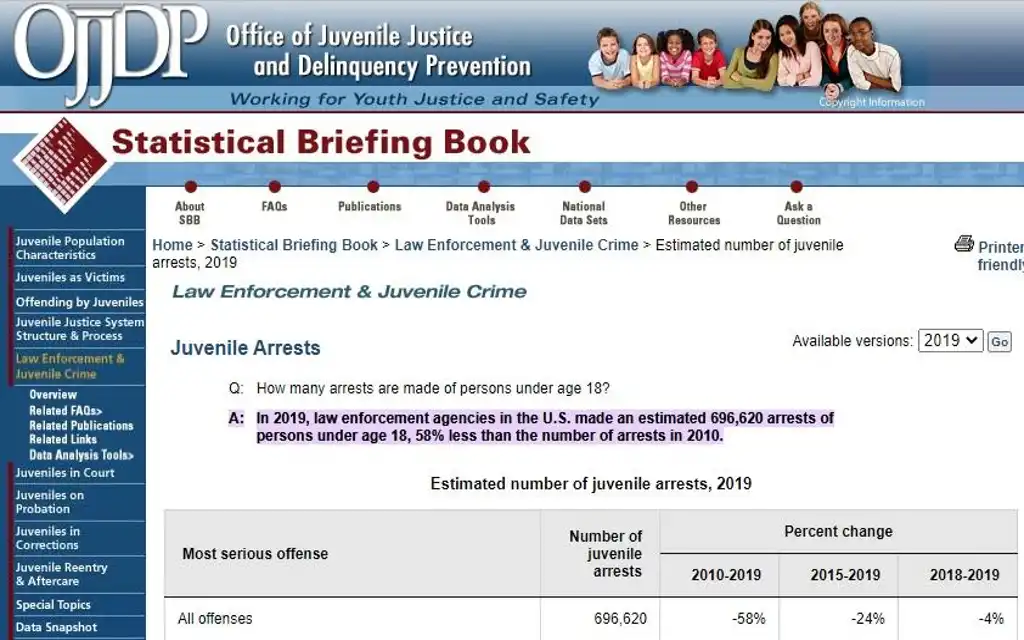
Do Juvenile Records Show Up on an Employment Background Check?
Juvenile records may be used against an individual when they show up on an employment background check in some instances. In most states, juveniles are legally considered adults when they turn 18. The general range spans between 16 and 19, with states like Illinois defining a minor as someone under the age of 17.4
When juveniles commit crimes, they will typically have their cases heard in juvenile courts, although on some occasions, they may be tried as adults due to the severity of the crime. In these cases, their criminal records will be public. It should be noted that adult criminal records do not clear after 7 years, but remain permanently.
Typically, when juveniles are not tried as adults, their records are sealed and private, only available to state and law enforcement agencies but generally not to the public. The point is, that a number of states will automatically expunge or seal juvenile records once the offender turns 18 which will be discussed in depth below. Sealed and expunged records will not appear in a background check no matter when the crime was committed.
On the other hand, if there are severe or felony charges, these records no longer enjoy the benefit of being sealed and will show up in a background check. If a juvenile is convicted for crimes such as murder, aggravated sexual assault, or armed robbery, then these would all show up in a background check.
Therefore, it depends on who and why these background checks are requested. Private employers or landlords would not have access to these expunged or sealed records.
If an educational employer requests a background check, the record would be available to them even if the record has been sealed. If someone is looking to work in a school and is convicted of assault, they would likely be looking at these sorts of records; therefore, these would show up in the screening.
But these employers, even those part of school districts, would need to provide a reason to a judge to view sealed records and obtain a court order.
So, addressing whether juvenile records may impact someone, they can appear in background checks and potentially have negative consequences, contingent on the factors mentioned earlier.
What is the Difference Between Sealing and Expunging Juvenile Records?
Sealing and expunging are terms often erroneously used interchangeably, with many thinking they denote the same process. The reality is that both have different connotations and implications regarding a record, whether criminal or court, juvenile or adult.
Expunging is essentially the process of physically destroying or deleting a record—the record, therefore, ceases to exist in data repositories. Upon a successful expungement, courts will present the petitioner documentation of the order as well a roster of agencies that have been notified of the same. At that point, the individual can legally claim that they don’t have a record.
Sealing Juvenile Records, on the other hand, limits the accessibility of these records to the public.5 They still physically exist in the repositories; they also exist legally, implying certain agencies may still access them.
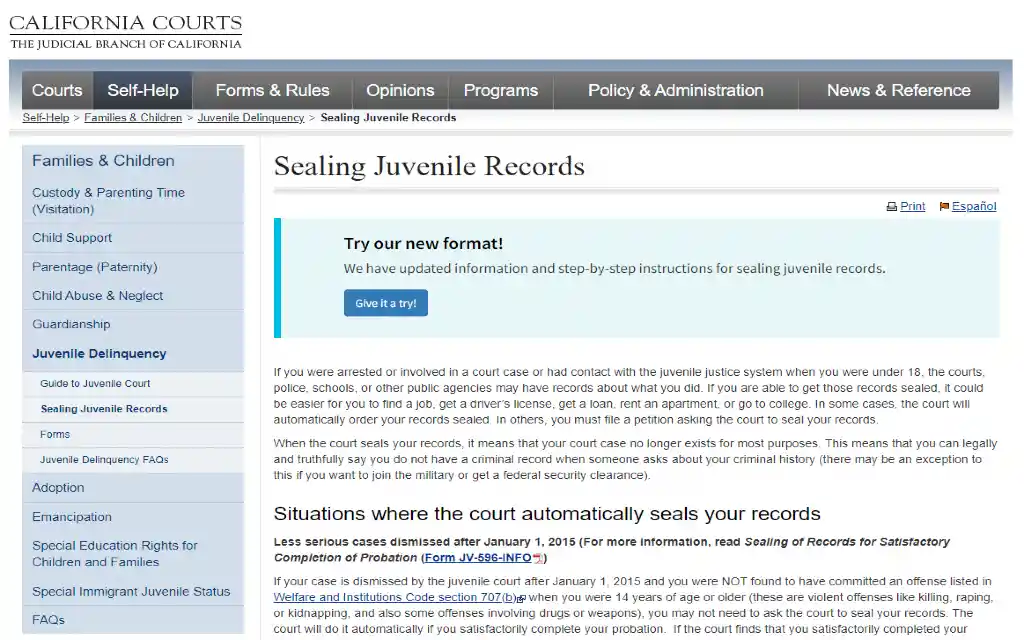
For example, law enforcement agencies and courts will still access these records. Educational institutions may also have access to these records through court orders. In these cases, individuals may still legally claim that they do not have a record, but it will not be a total deletion of the record.
Do Any States Seal Juvenile Records Once The Offender is an Adult?
As mentioned earlier, there are some instances when juvenile records are automatically expunged or sealed when the minor transitions into adulthood. These records may also be sealed once the court proceedings are completed.
In some states, for example, Oregon, when a juvenile becomes an adult, the records become eligible for expungement after specific criteria are met— Oregon Revised Statute 419A.262.6
In Oregon, these criteria include:
- Five years have elapsed since probation concluded
- The offenses are not felonies or class A misdemeanors
Lawmakers are aware of the effect these records have on a person’s life upon transitioning into adulthood. Several laws in states have been passed to protect these juvenile records. Consequently, a number of states in the union have passed laws to automatically expunge and seal these records under certain conditions—one of which depends largely on the severity of the offenses.
Some states such as North Carolina have also taken the proactive step of raising the age upon which minors can still be tried under juvenile courts rather than adult courts.7 This is a positive step in the rehabilitation of a juvenile offender.
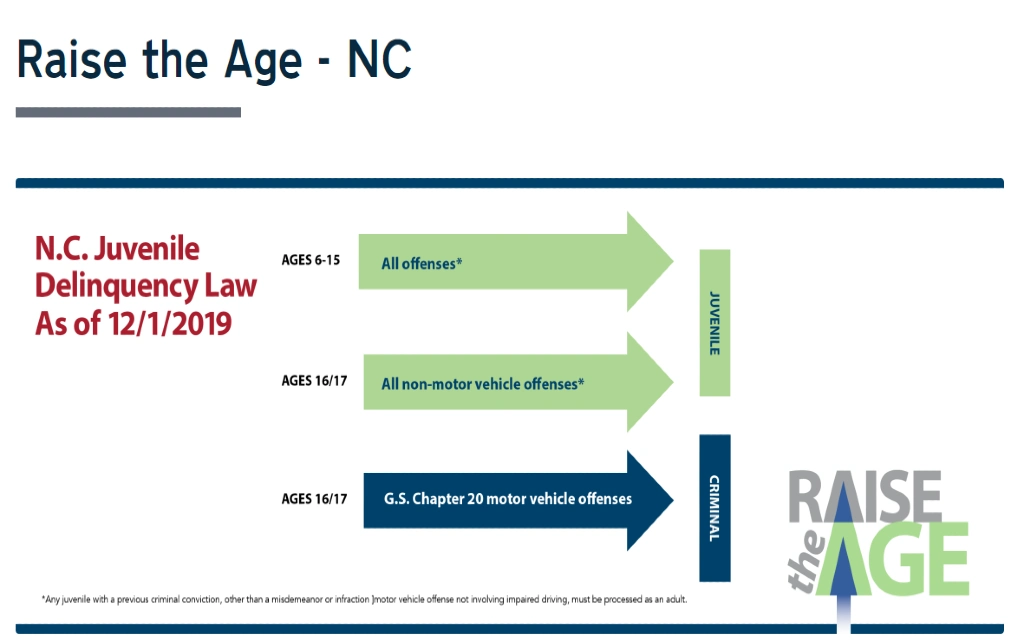
There are 15 states that seal or expunge records once the offender is an adult, and these include Virginia, Texas, South Carolina, North Dakota, New Mexico, New Hampshire, Nevada, Nebraska, Maryland, Montana, Illinois, Florida, California, Arkansas, and Alaska.8
There is a variance on whether these states expunge or seal these juvenile records. States like Alaska and Montana seal a juvenile’s records when they reach the age of 18 years. Others like Illinois expunge minor offenses upon reaching 18, only if the minor has not been arrested within the last six months.
Florida automatically deletes juvenile records for minors who are not severe offenders; the state also destroys these records when the offender attains the age of 26.
When Do Juvenile Records Quit Affecting You?
As mentioned before, juvenile records may affect someone into adulthood depending on the severity of the crime or the number of repeat offenses. There are a number of instances when juvenile records will quit affecting you:
- Other than the states mentioned that automatically seal or expunge records, some states allow for a period to elapse before sealing or expunging records. Often, a juvenile who had been adjudicated delinquent—is found guilty of violating criminal law in juvenile court but not convicted of a crime as they would in an adult court have records remain on file until they turn 28.
- Diversions may stay on record until the minor turns 21. Diversion is a system that allows a juvenile offender to be turned away from the official juvenile system—for instance, performing community service, thus making them accountable for their actions.9
- Also, juvenile records will not affect a minor upon automatic expungement and sealing, which takes place in the states aforementioned. These new adults do not need to do anything more, and the records will cease to follow them as adults.
- Individuals may also choose to manually petition for juvenile records to be sealed or expunged in the relative court—expounded later below. When this happens, the records will no longer affect someone except in some instances.
In cases where there is a felony conviction, i.e., the juvenile is referred to adult court and sentenced, then the record becomes a formal criminal record as in the instance of an adult.
A study shows many states are not proactive in expunging/ sealing or keeping juvenile records confidential, which makes these detrimental to the lives of these individuals when they become adults.10 Ideally, juvenile systems are rehabilitative and should not be used to penalize someone’s future, especially when the objective is reform.
How to Get Juvenile Criminal Records Expunged or Sealed
Often, juvenile criminal charges become eligible for expungement or sealing after a 5 year wait period. This is not the case for all criminal records. Records which involve felonies, aggravated sexual assaults, child abuse, and crimes involving children are typically not eligible for expungement. Also, if someone currently has pending criminal charges, they would not be able to apply to have their juvenile records deleted.
Related Reading: Pending charges and their appearance on background checks.
The process of expunging or sealing juvenile criminal records differs by state. A petitioner must contact the court handling the juvenile case and request expungement or sealing of the record. The court clerk would typically be the point of contact to obtain forms and instructions and pay the necessary fees for the process to be initiated. The process can be done with the services of an attorney or can be a self-petition. In some cases, there may be no cost to commencing the process.
It should be noted that often sealed records may still be accessible to law enforcement. If an applicant is looking to obtain employment in law enforcement or any secure job, these records may still be retrieved. Many times, serious offenses mentioned earlier, will usually not be eligible for expungement or sealing.
Individuals who inquire about the impact of juvenile records should understand their potential influence and consider measures to limit their impact, ensuring future opportunities remain intact and promoting responsible citizenship.
Frequently Asked Questions
Does a Juvenile Record Affect Firearm Purchases?
It depends. If a juvenile record has been sealed or expunged, then the record is not accessible to the public and, in the eyes of the law, has no criminal record. They will therefore have no issues in purchasing a firearm. However, if the juvenile record reflects a convicted felon, then the law applies as would an adult—it is a criminal offense for convicted felons to purchase or possess firearms as per CGS § 53a-217.
Can a Sealed or Expunged Juvenile Record Be Used Against You?
It depends. By all accounts, sealed juvenile records are not publicly accessible, and someone can still apply for a job, obtain housing, attend college or obtain driving privileges without bars. However, sealed records are still accessible to law enforcement agencies, courts, and educational institutions with a court order. When an individual procures employment necessitating security clearance, these records may be used against them. Also, courts may use these sealed records during hearings as an adult.
How to Check if My Juvenile Record is Sealed?
The best way to ascertain if your juvenile record is sealed would be to contact the court where the juvenile hearing occurred. Contact the clerk of the court to verify this information.
In addition, be sure to check if the juvenile records were sealed or expunged automatically.
1 McGUINESS, P. J. (2006, June 23). In re Jeffrey T. Retrieved 2002, from casetext.com: <https://casetext.com/case/in-re-jeffrey-t>
2 Justice, U. D. (2019). Law Enforcement & Juvenile Crime. Retrieved 2022, from Office of Justice Programs: <https://www.ojjdp.gov/ojstatbb/crime/qa05101.asp#:~:text=A%3A,number%20of%20arrests%20in%202010.>
3 Prevention, O. o. (2020, December). Expunging Juvenile Records: . Retrieved 2022, from <www.ojjdp.ojp.gov: https://ojjdp.ojp.gov/publications/expunging-juvenile-records.pdf>
4 Commission, I. J. (2009). ijjc.illinois.gov. Retrieved 2022, from Raising the Age of Juvenile Court Jurisdiction: <https://ijjc.illinois.gov/resources/publications/reports/raising-the-age-of-juvenile-court-jurisdiction/>
5 California, C. C.-T. (2022). Sealing Juvenile Records. Retrieved 2022, from www.courts.ca.gov: h <https://www.courts.ca.gov/28120.htm?rdeLocaleAttr=en.>
6 Legislature, O. (2021). Chapter 419A — Juvenile Code: General Provisions and Definitions. Retrieved 2022, from <https://www.oregonlegislature.gov/bills_laws/ors/ors419a.html>
7 General Assembly, N.C. (2019). Session Law 2019-186 Senate Bill 413. Retrieved 2022, from www.ncleg.gov: <https://www.ncleg.gov/EnactedLegislation/SessionLaws/HTML/2019-2020/SL2019-186.html>
8 Teigen, A. (2016, July). Automatically Sealing or Expunging Juvenile Records. Retrieved 2022, from National Conference of State Legislatures: <https://www.ncsl.org/research/civil-and-criminal-justice/automatically-sealing-or-expunging-juvenile>
9 Massachusetts, C. o. (2020, November 2). www.mass.gov. Retrieved 2022, from Information about Juvenile Diversion: <https://www.mass.gov/info-details/information-about-juvenile-diversion#:~:text=Diversion%20can%20be%20defined%20as,or%20prosecution%20in%20Juvenile%20Court>
10 Center, J. L. (2018). FAILED POLICIES, FORFEITED FUTURES. Retrieved 2022, from <https://juvenilerecords.jlc.org/: https://juvenilerecords.jlc.org/juvenilerecords/#!/map>

